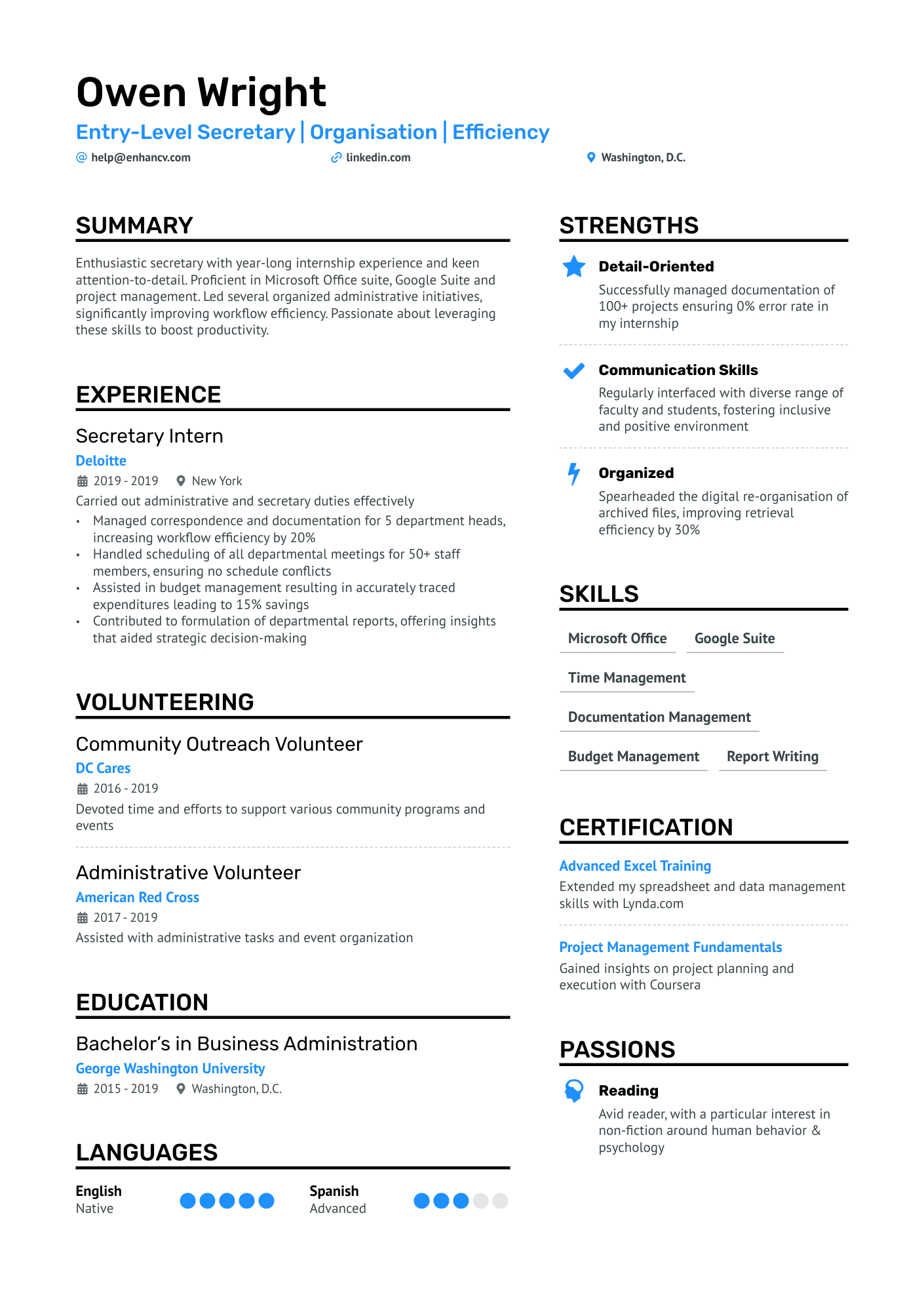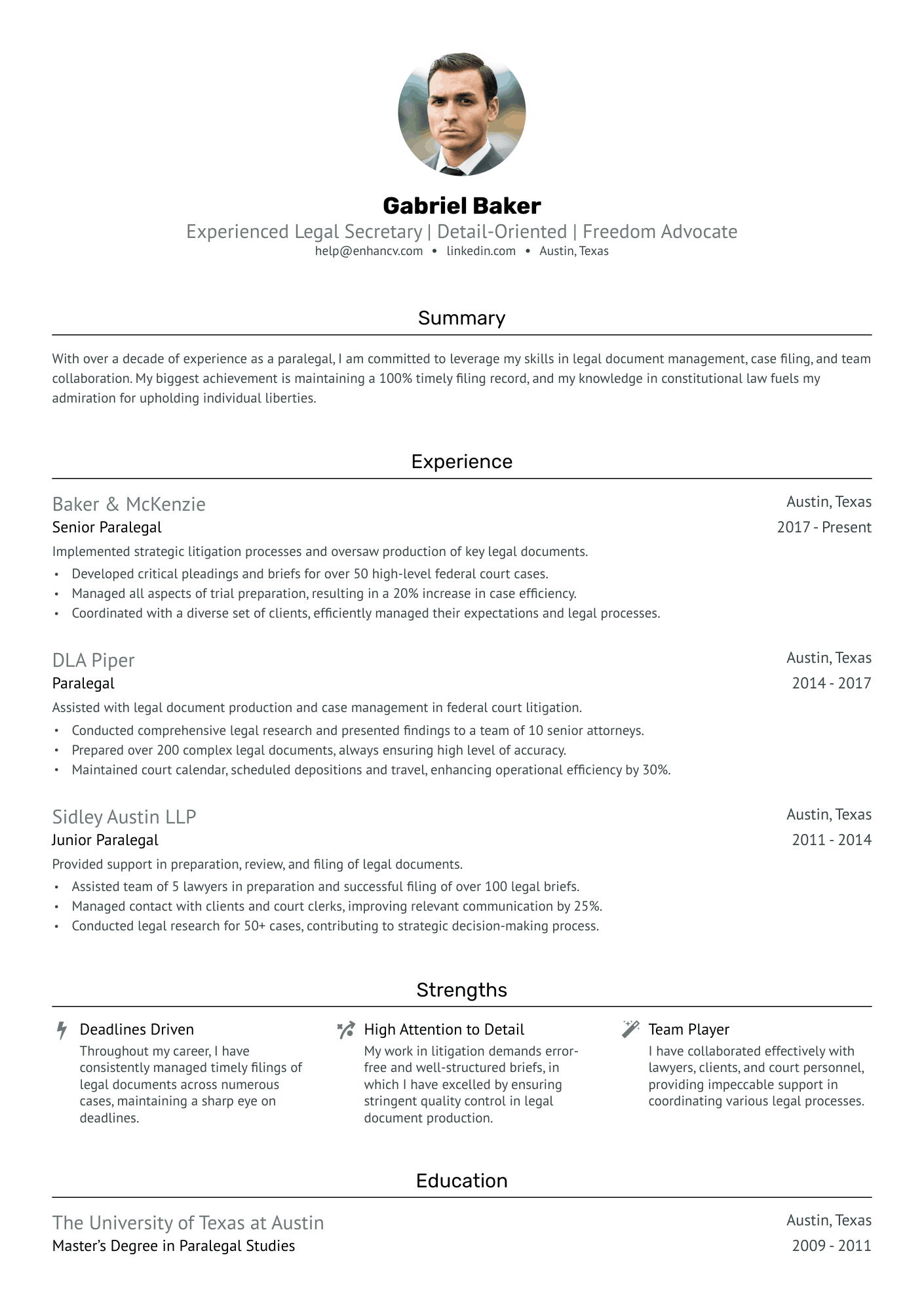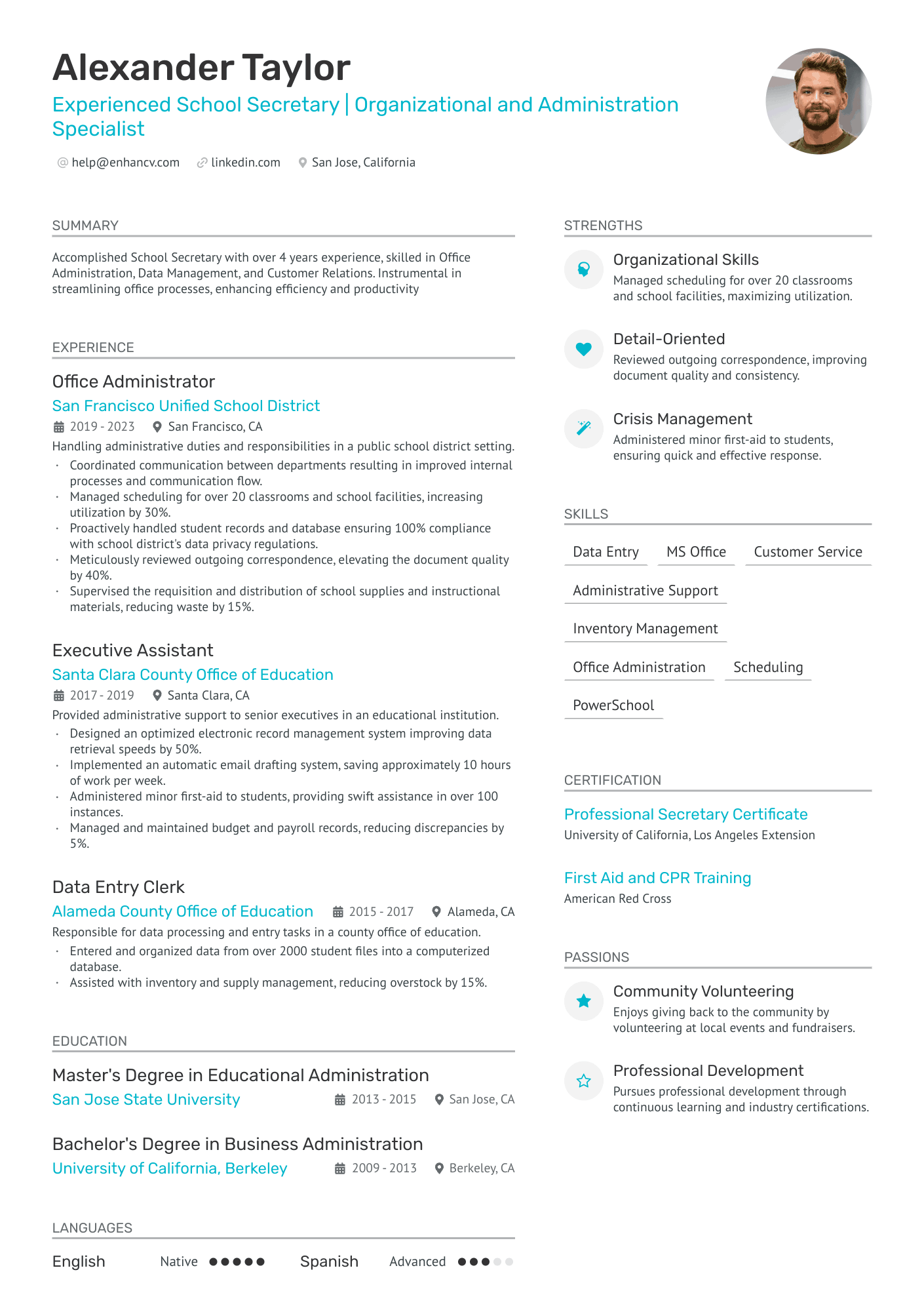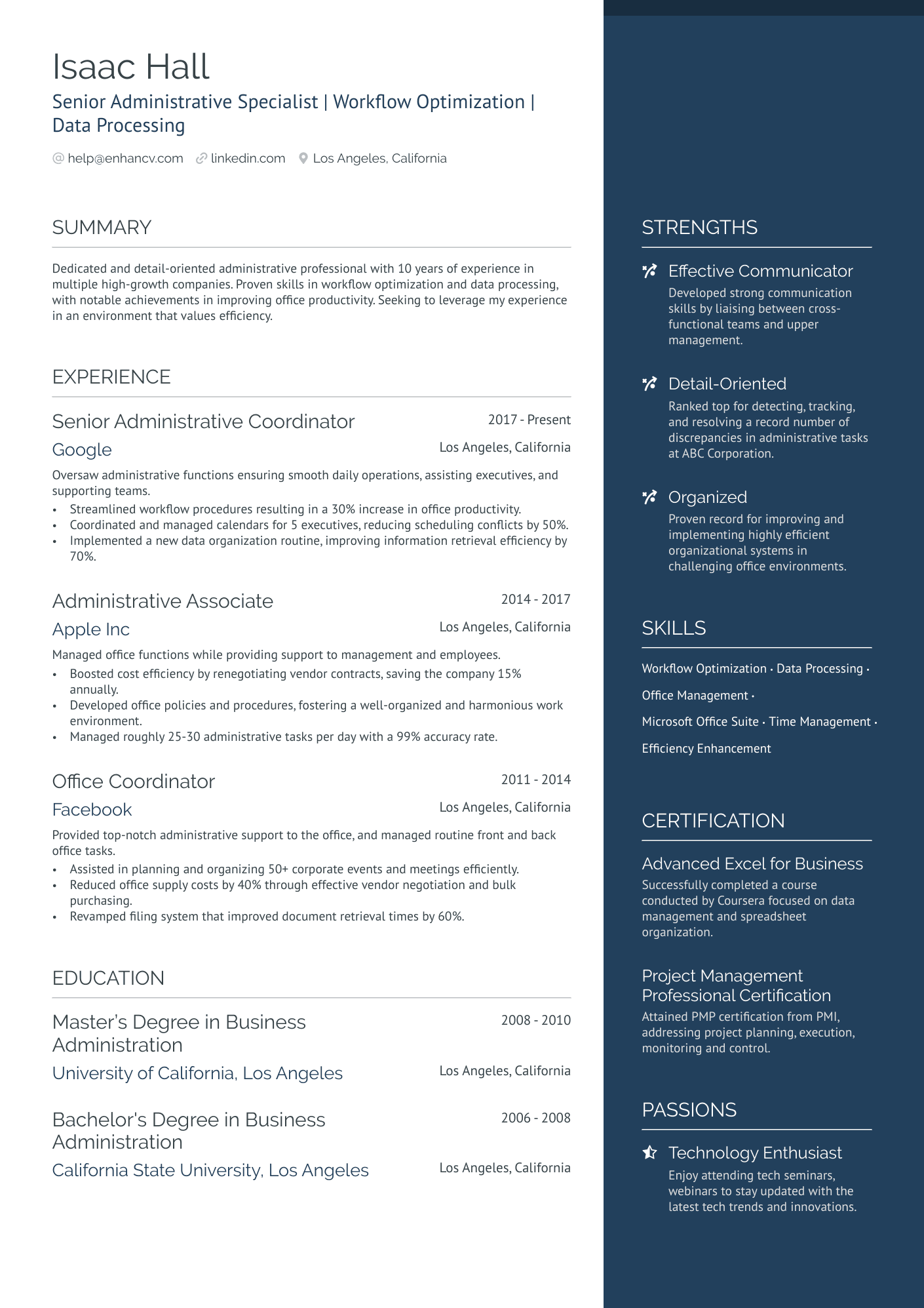Being a secretary, especially as the sole employee, has its challenges. Some struggle with the thought that they have limited career growth opportunities, but others enjoy having all these projects around the office and tasks to keep them occupied. Yes, the role mainly involves clerical work, and the compensation might not always reflect the scope of duties performed.
Despite these hurdles, the job teaches valuable skills like organization, multitasking, and effective communication, laying a strong foundation for any future career path including in HR, Marketing, Project management, Law, etc. Every experience contributes to your professional growth.
For those looking to enter or transition into the secretarial field, having a compelling resume is important. This guide will teach you how to present your skills and experiences on your resume and more.
You'll also discover:
- How to choose a resume format that shows off your secretarial experience and passes ATS checks;
- How to highlight your top achievements in the work experience section;
- How to list key secretarial skills that match the job ad's keywords;
- How to open with a concise summary or objective that will impress employers.
Interested in exploring other roles within the administrative field? Browse through our related guides for more insights.
- Legal secretary Resume
- School secretary Resume
- Administrative secretary Resume
- Office Assistant Resume
- Office Administrator Resume
- Secretary Cover Letter Example
How to format a secretary resume
If you're an experienced secretary, using a reverse chronological resume can effectively show your successes across different offices or organizations.
In case you're new to the secretarial profession and thinking about the best way to present your resume, there are a couple of options worth considering. A hybrid resume could be the perfect solution if you’re switching fields or have accumulated skills from multiple jobs. It helps you illustrate a combination of your abilities along with your professional experiences.
Another case is if you've had some gaps in employment. In a situation like this, a functional resume might be the way to go. It's not the usual pick for secretary jobs, but it focuses more on your skills and what you can do, rather than just listing jobs in order, so it could really help you stand out.
Explore these formatting hacks to grab attention:
- Pick a resume template that suits your professional style. A two-column layout is great for holding plenty of information and makes it easy to read quickly.
- Use professional fonts. In addition to Arial, Calibri, and Times New Roman, our resume builder includes ATS-friendly options like Lato, Rubik, and Volkhov. Stick to a font size of 10 to 12 points for clarity.
- Choose an easy-to-read layout with adequate spacing and 1-inch margins.
- Check the job description to find out if you need to add a photo to your resume. While it's often not recommended in the US, your role may require one due to frequent face-to-face interactions.
- Strive for a one-page resume, which is often more effective than a longer one.
- Start with a header that includes your name, professional title, and contact information.
- Always save your resume as a PDF to keep its formatting consistent across different devices.
Adding your updated LinkedIn profile link to your resume could boost your chances of landing an interview by 71%. It's a simple yet effective move many overlook.
Take advantage of our intuitive AI resume checker. It evaluates your resume on 16 crucial points for free, helping you make it impressive to recruiters.
Is your resume good enough?
Drop your resume here or choose a file. PDF & DOCX only. Max 2MB file size.
Consider these key resume sections to enhance your application.
The top sections on a secretary resume:
- Contact information: It is essential to include your full name, address, phone number, and professional email for the employer to reach out to you easily.
- Profile summary: A well-written summary that highlights your experiences and skills as a secretary can instantly catch the attention of recruiters.
- Professional experience: This section is crucial to illustrate your work history relevant to the secretary position.
- Relevant skills: Including a list of your secretarial skills like communication, organization, and computer skills, for instance, can demonstrate your capabilities to perform the secretary role effectively.
Put together carefully, these sections can prove you're a good match for the role. Spend some time reviewing the job description to find relevant keywords that you should add to your resume. Below are some key elements recruiters look for that your secretary’s resume absolutely needs to include.
What recruiters want to see on your resume:
- Relevant experience: Recruiters look for candidates with prior experience in secretary roles as this indicates familiarity with the duties and challenges of the job.
- Organizational skills: Secretaries need to manage calendars, schedule appointments, and keep track of various documents, so recruiters prioritize candidates who demonstrate exceptional organizational abilities.
- Communication skills: As secretaries often serve as a bridge between management and other staff or external parties, strong oral and written communication skills are highly prioritized.
- Technological knowledge: Modern offices require the use of various software tools and platforms such as Microsoft Office, scheduling programs, and databases. Therefore, recruiters give preference to candidates adept at using these tools.
- Professionalism: A secretary often acts as the public face of an organization, engaging with clients and visitors. Therefore, recruiters value candidates who demonstrate professionalism, politeness, and approachability.
Next, let's focus on the information for your upcoming resume, beginning with your work experience.
How to write your secretary resume experience
This section is crucial as it shows your experience and specific areas of expertise. While other parts of the resume contribute to your overall profile, your work history concretely displays your hands-on skills and notable achievements.
For a secretary role, it's best to list your work experiences starting with the most recent position and moving backward. Make sure to include the job title, the name of your employer, the location, and the dates you were employed. It's also vital to detail your responsibilities and accomplishments through bullet points, using action verbs to kick things off.
For example, you can highlight improvements you made, such as "Introduced a digital filing method that reduced time spent on document searches by 20%."
Let's review an example of how NOT to present your work experience.
- •Involved with office documents and their organization.
- •Scheduled activities for executives.
- •Dealt with incoming and outgoing communications.
- •Assisted in the coordination of various events and meetings.
Why this isn’t a good example:
- It doesn't show how the work helped the office run smoother.
- There are no numbers to prove things got better.
- It skips over any special skills.
Let's check out a better example.
- •Improved document organization, leading to a 20% faster retrieval time.
- •Managed and optimized schedules for executives, leading to a 50% reduction in scheduling conflicts.
- •Handled all incoming and outgoing communications, ensuring a 24-hour response time.
- •Played a key role in planning and executing corporate events, increasing attendee satisfaction.
The second example stands out because it includes specific metrics that employers notice. It shows clear achievements and the impact of your work.
It's important to note that all these efforts won't make a difference if your resume isn't tailored to work well with ATS systems. Employers use them to sort through resumes by looking for certain keywords, skills, and qualifications related to the job.
You might be thinking about other ways to make a good impression with your experience, and the good news is, there are. Below you’ll find more ideas.
How to quantify impact on your resume
You can show your impact by adding specific numbers to your resume. This is key as it offers solid proof of what you've done. Consider adding some of these things if applicable to your resume:
- Quantify the number of executives or staff members you provided support for in your past roles.
- Specify the volume of calls or emails you've managed on a daily, weekly, or monthly basis.
- Reference the size of meetings or events you've coordinated in terms of participants.
- Indicate the amount of data in files or documents you were responsible for managing or archiving.
- List the number of travel schedules and accommodations you've arranged.
- Detail the percentage of time or resources you have saved through efficiency improvements or procedure changes.
- Display the number of reports or documents you have prepared or proofread.
- Include the number of languages you're fluent in, as multilingual abilities could be highly beneficial in communication.
PRO TIP
Including a unique section like My Time can be quite beneficial because it can show how you manage your daily tasks, giving insight into your time management.
Next, let's discuss the more essential skills that a secretary should possess to be considered suitable for the position.
How to list your hard and soft skills on your resume
Adding a skills section to your resume shows important abilities, flexibility, and professionalism, crucial for both seasoned secretaries and those just starting.
For a secretary, hard skills include specific, learnable talents such as typing speed, proficiency in office software, and understanding of administrative procedures. Soft skills involve personal qualities and social abilities like dependability, attention to detail, effective communication, and more.
PRO TIP
When picking skills to feature in your resume, make sure they're relevant to the position you’re applying to. The point of listing skills is for you to stand out from the competition. Stay away from repetitive, meaningless skills that everyone uses in their resumes.
Best hard skills for your secretary resume
- Typing speed
- Microsoft Office
- Office Administration Software
- Data entry skills
- Record keeping
- Proficiency in CRM software
- Proficiency in ERP systems
- Business correspondence
- Database management
- Professional phone etiquette
- Data analysis
- Slack/Google Meet/MS Teams
- Accounting software like QuickBooks
- Calendar and scheduling tools
- Email management
- Project management tools like Trello or Asana
Your role demands a strong soft skills set, too.
Best soft skills for your secretary resume
- Loyalty
- Communication
- Time management
- Problem-solving
- Decision making
- Organizational Skills
- Multitasking
- Attention to Detail
- Active listening
- Coordinating
- Confidentiality
- Diplomacy
- Resilience
- Patience
- Integrity
- Proactivity
Typically, it's best to list between 5 to 10 skills on your resume. Pick those that match the job description and showcase your strengths. Customize this part for every job application, to mirror the skills the employer seeks.
How to list your education and certifications on your resume
In your resume's education section, you can list any degrees and certifications you have. While office secretaries don't need formal training, having a degree or one you're working towards can offer more insight into your background to employers. Make sure to mention any honors or special recognitions too. If you have a degree beyond a bachelor's, it's okay to skip listing your high school education.
What to include in the education part of your secretary resume:
- Degree name: Specify the degree you have.
- Institution name: Name the place where you got your education.
- Graduation date: When you graduated or when you expect to graduate.
- Field of study: If applicable, mention your field of study, especially if it's related to data management or IT.
- Certifications: List any certificates you obtained related to data entry.
- GPA: Include your GPA if it's over 3.5 and you've graduated recently.
Check out the resume example below for guidance:
- •Specialization: Administrative Management
PRO TIP
If you hold a certain major and a minor, your majors should be mentioned first.
Certifications in office management, software usage, and data security on your resume can significantly enhance your profile for a secretary position and show employers your initiative in expanding your skill set beyond traditional education.
Here, we recommend 4 certifications that are valuable for secretary roles.
Best certifications for your secretary resume
Let's proceed to the part of your resume that first grabs the attention of hiring managers - the summary or the objective.
How to write your secretary resume summary or objective
Making a strong resume summary or objective for a secretary role means clearly showing your skills, experience, and what you bring to the job. The choice between a summary and an objective depends on your professional history and career goals.
Here's a guide to help you choose.
Resume summary
A resume summary works best for secretaries who have a lot of experience. It should showcase your main achievements, crucial skills, and how you fulfill the requirements of the office or company.
Here's a winning approach:
Resume Summary Formula
PRO TIP
When writing a resume summary or objective, avoid first-person narrative.
Resume objective
If you're starting as a secretary, consider an objective statement. It focuses on what you aim to accomplish, your key skills, and how you plan to enhance and contribute to the success of the office or organization.
Here are practical tips for crafting a compelling summary or objective tailored specifically for a secretary role:
- Be succinct: Keep it short up to 3 sentences for a resume objective and up to 5 for a summary. Make sure the statement clearly shows your work history or goals.
- Personalize it: Customize your summary or objective to match the requirements of the secretary position and the unique characteristics of the office or organization you're applying to.
- Use relevant numbers: Enhance your credibility by providing specific examples and measurable metrics that highlight your successes in previous roles. For instance, you could mention, "Managed scheduling for 50+ appointments weekly with a 90% on-time rate."
- Focus on key skills: Underline important skills needed for a secretary job, like being good at managing the office, talking and writing clearly, and paying close attention to details.
By dedicating effort to creating a tailored and concise summary or objective, you can significantly elevate the impact of your resume.
Additional sections for a secretary resume
To enhance your secretary's resume, think about adding a few extra sections. These can offer a fuller picture of who you are to recruiters:
- Volunteer work: Got experience volunteering, especially in roles that involve organization, health, or customer service? Share it. It highlights your willingness to go the extra mile.
- Achievements: Share your wins, like any awards, positive feedback, or events you've coordinated. This can show your commitment and skills.
- Language skills: If you speak more than one language, definitely mention it. It’s a big plus in communicating with a varied group of people.
- Passions: Talk about what you love doing outside of work, like reading, outdoor activities, or traveling. These hobbies and interests can show your well-rounded nature and suitability for the company’s culture.
- Professional references: Including references from previous jobs can boost your secretary's resume. Pick those who can share positive feedback about your work and attitude no matter the industry.
Key takeaways
Here’s what you should be taking away:
- Choose a resume layout that sends the right message and fits your current career situation;
- Be specific about your experience, accomplishments, and future goals in your summary or objective;
- Use keywords from the job ad to make your resume Applicant Tracking Systems (ATS) friendly.
- Feature detailed metrics and specific examples that show the impact you made in your previous roles;
- Add all of your certifications that you have and match the job description;
- Show off a dash of personality in your resume that will demonstrate your culture fit and the right mix of hard and soft skills.
Secretary resume examples
Explore additional secretary resume samples and guides and see what works for your level of experience or role.
By Experience
Entry-Level Secretary
By Role








